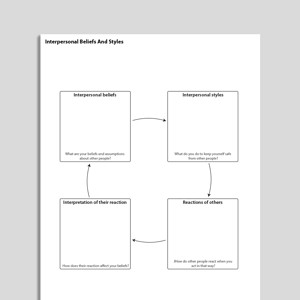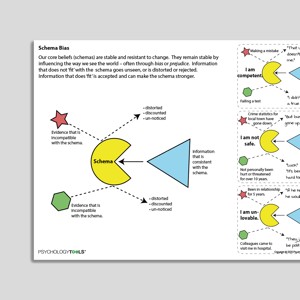

Schema therapy posits that psychological difficulties stem from early maladaptive schemas (EMS) and clients’ characteristic responses to them, refer . https://www.psychologytools.com/resource/social-isolation

Schema therapy posits that psychological difficulties stem from early maladaptive schemas (EMS) and clients’ characteristic responses to them, refer . https://www.psychologytools.com/resource/subjugation

Schema therapy posits that psychological difficulties stem from early maladaptive schemas (EMS) and clients’ characteristic responses to them, refer . https://www.psychologytools.com/resource/insufficient-self-control
 Unhelpful Thinking Styles (Archived)" />
Unhelpful Thinking Styles (Archived)" />
NOTE: Two improved versions of this resource are available here: Cognitive Distortions – Unhelpful Thinking Styles (Common) and Cognitive Disto . https://www.psychologytools.com/resource/unhelpful-thinking-styles-archived

Unmet emotional needs can give rise to early maladaptive schemas, and other forms of maladaptive coping. This Unmet Emotional Needs handout forms part . https://www.psychologytools.com/resource/unmet-emotional-needs

Trauma can result in a wide variety of symptoms, experiences, and behaviors. As well as post-traumatic stress disorder (PTSD), prevalence rates of oth . https://www.psychologytools.com/resource/how-trauma-can-affect-you-cyp

Schema therapy posits that psychological difficulties stem from early maladaptive schemas (EMS) and clients’ characteristic responses to them, refer . https://www.psychologytools.com/resource/mistrust-abuse

Schema therapy posits that psychological difficulties stem from early maladaptive schemas (EMS) and peoples’ characteristic responses to them, refer . https://www.psychologytools.com/resource/what-are-schemas

Schema therapy posits that psychological difficulties stem from early maladaptive schemas (EMS) and clients’ characteristic responses to them, refer . https://www.psychologytools.com/resource/abandonment

Schema therapy posits that psychological difficulties stem from early maladaptive schemas (EMS) and clients’ characteristic responses to them, refer . https://www.psychologytools.com/resource/punitiveness

Schema therapy posits that psychological difficulties stem from early maladaptive schemas (EMS) and clients’ characteristic responses to them, refer . https://www.psychologytools.com/resource/coping-styles-and-responses-schema-therapy

Schema therapy posits that psychological difficulties stem from early maladaptive schemas (EMS) and clients’ characteristic responses to them, refer . https://www.psychologytools.com/resource/pessimism

Schema therapy posits that psychological difficulties stem from early maladaptive schemas (EMS) and clients’ characteristic responses to them, refer . https://www.psychologytools.com/resource/emotional-deprivation

Schema therapy posits that psychological difficulties stem from early maladaptive schemas (EMS) and clients’ characteristic responses to them, refer . https://www.psychologytools.com/resource/failure-to-achieve

Schema therapy posits that many longstanding psychological difficulties stem from unmet core emotional needs, the early maladaptive schemas (EMS) they . https://www.psychologytools.com/resource/how-your-past-affects-your-present-schema-therapy

Core beliefs (schemas) are self-sustaining. They act to 'attract' confirmatory evidence and 'repel' (or distort) disconfirmatory evidence. This inform . https://www.psychologytools.com/resource/core-belief-magnet-metaphor

Schema therapy posits that psychological difficulties stem from early maladaptive schemas (EMS) and clients’ characteristic responses to them, refer . https://www.psychologytools.com/resource/enmeshment

CBT therapists often describe finding it difficult to apply CBT skills when clients bring relational problems to therapy. Familiar methods of visu . https://www.psychologytools.com/resource/reciprocal-cbt-formulation

Schema therapy posits that psychological difficulties stem from early maladaptive schemas (EMS) and clients’ characteristic responses to them, refer . https://www.psychologytools.com/resource/emotional-inhibition

Schema therapy posits that psychological difficulties stem from early maladaptive schemas (EMS) and clients’ characteristic responses to them, refer . https://www.psychologytools.com/resource/defectiveness

Interpersonal issues and relationship problems form an important part of what clients bring to therapy: they might present as clients’ current conce . https://www.psychologytools.com/resource/interpersonal-beliefs-and-styles

Schema therapy posits that psychological difficulties stem from early maladaptive schemas (EMS) and clients’ characteristic responses to them, refer . https://www.psychologytools.com/resource/approval-admiration-seeking

Beck's cognitive model proposes that cognition and perception in the here-and-now are influenced by our 'schemas', which shape our perception and info . https://www.psychologytools.com/resource/schema-formulation

Developing self-monitoring skills teaches clients to systematically observe and record specific targets such as their own thoughts, body feelings, emo . https://www.psychologytools.com/resource/boundaries-self-monitoring-record

Schema therapy posits that psychological difficulties stem from early maladaptive schemas (EMS) and clients’ characteristic responses to them, refer . https://www.psychologytools.com/resource/dependence-incompetence

Schema therapy posits that psychological difficulties stem from early maladaptive schemas (EMS) and clients’ characteristic responses to them, refer . https://www.psychologytools.com/resource/entitlement

Core beliefs (schemas) are self-sustaining. They act to 'attract' confirmatory evidence and 'repel' or 'distort' disconfirmatory evidence. This inform . https://www.psychologytools.com/resource/schema-metaphors

Core beliefs (schemas) are self-sustaining. They act to 'attract' confirmatory evidence and 'repel' or 'distort' disconfirmatory evidence. This inform . https://www.psychologytools.com/resource/schema-bias

Unwanted images are a feature common to a variety of problems including PTSD and depression. Imagery rescripting is an evidence-based treatment techni . https://www.psychologytools.com/resource/what-is-imagery-rescripting
Psychology Tools makes every effort to check external links and review their content. However, we are not responsible for the quality or content of external links and cannot guarantee that these links will work all of the time.
Young and colleagues have identified 18 early maladaptive schemas, which can be assessed using the Young Schema Questionnaire (YSQ). They include: